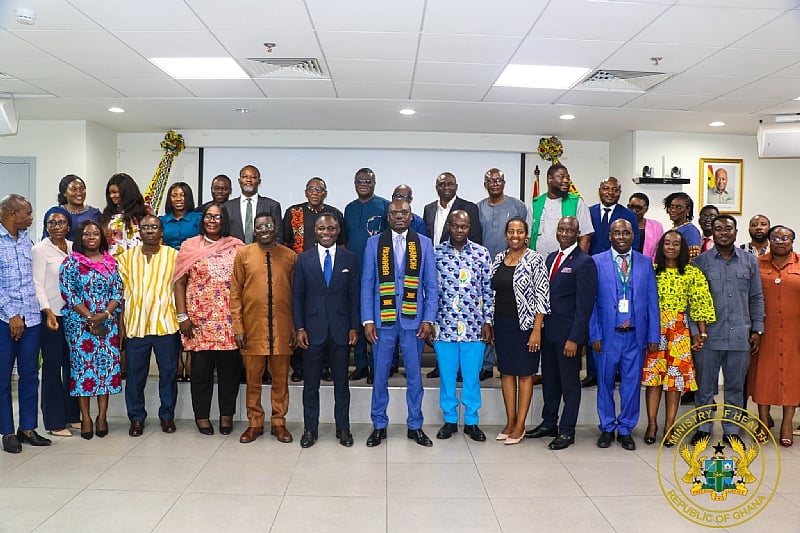Ghana is poised to bolster its health security framework with the imminent introduction of a new Health Security Bill. Health Minister Kwabena Mintah Akandoh announced the bill’s readiness, stating it will soon be submitted to Cabinet and Parliament for approval. This legislative move underscores Ghana’s commitment to enhancing national health resilience, a crucial aspect of safeguarding the population against future health crises. The bill’s development reflects a proactive approach to strengthening the country’s capacity to prevent, detect, and respond to public health emergencies, encompassing infectious disease outbreaks, natural disasters, and other health threats. The bill’s contents, while not explicitly detailed in the announcement, are likely to address critical areas such as surveillance systems, emergency preparedness plans, resource allocation, and international collaboration.
The Minister’s announcement coincided with a visit from Dr. Jean Kaseya, Director-General of the Africa Centres for Disease Control and Prevention (Africa CDC), highlighting the importance of continental collaboration in health security. Mr. Akandoh reiterated Ghana’s dedication to Primary Health Care (PHC) and its pursuit of Universal Health Coverage (UHC). He emphasized the government’s recognition of financial barriers as a significant impediment to accessing healthcare services. The rollout of free primary healthcare is envisioned as a crucial step towards achieving UHC, ensuring equitable access to essential health services for all Ghanaians, regardless of their financial status. This commitment to strengthening PHC aligns with global health strategies recognizing PHC as the foundation of strong and resilient health systems.
Mr. Akandoh expressed gratitude for Africa CDC’s ongoing support to Ghana, acknowledging its contributions to strengthening the country’s health infrastructure and capacity. He advocated for the development of sustainable financing models to address the persistent healthcare funding gap that plagues many African nations. He urged a paradigm shift in thinking, encouraging African countries to move beyond reliance on external funding and embrace innovative solutions to finance their health systems. This call for self-reliance reflects a growing recognition of the need for African countries to take ownership of their health destinies and invest strategically in their own health security.
Dr. Kaseya, during his visit, highlighted a critical vulnerability within the African health landscape: the over-reliance on imported medical solutions. He pointed to the continent’s dependence on external sources for vaccines and medications to combat diseases like Ebola, Marburg, and cholera, underscoring the need for local production capacity. This dependence on imported medical products creates a precarious situation, leaving African nations vulnerable to supply chain disruptions, price fluctuations, and potential shortages during emergencies. Dr. Kaseya’s comments emphasize the urgency of developing domestic pharmaceutical manufacturing capabilities to ensure access to essential medicines and vaccines during outbreaks and health crises.
Dr. Kaseya’s visit also served as a prelude to an upcoming summit involving 19 African Heads of State, focusing on the challenges surrounding local pharmaceutical manufacturing and access to health technologies. This high-level engagement demonstrates the growing political will to address the continent’s health security vulnerabilities and build more resilient health systems. The summit provides a platform for African leaders to collaborate on strategies to promote local production, strengthen regulatory frameworks, and facilitate technology transfer to enhance access to essential medicines and health technologies.
Dr. Kaseya’s message resonated with a call for African nations to move beyond dependence on foreign aid and prioritize investments in their own medical solutions. He stressed the crucial role of innovation, investment, and strong leadership in achieving this transformation. He cautioned that the convergence of conflict, inadequate funding, and weak health systems creates a fertile ground for future pandemics. This warning serves as a powerful reminder of the interconnectedness of these factors and the need for a comprehensive approach to strengthening health security. Dr. Kaseya’s concluding remarks reaffirmed the shared commitment between Ghana and Africa CDC to collaborate on building a more robust and self-reliant health sector for Ghana and the entire African continent. This collaborative approach signifies a collective effort to create a future where Africa is better equipped to protect its citizens from health threats and achieve sustainable health outcomes.














